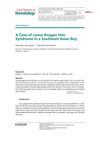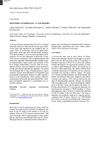 March 2022 in “Wound practice & research”
March 2022 in “Wound practice & research” New treatments for alopecia areata show promise, but standardized guidelines are needed.
 November 2023 in “Australasian journal of dermatology”
November 2023 in “Australasian journal of dermatology” Dermatologists are essential in helping transgender and gender diverse patients with skin and hair issues related to gender affirmation and hormone therapy.
 15 citations,
November 2002 in “Cardiology in Review”
15 citations,
November 2002 in “Cardiology in Review” Cardiovascular drugs can cause various skin problems, so recognizing these reactions is important.
 June 2020 in “Journal of Dermatological Treatment”
June 2020 in “Journal of Dermatological Treatment” Use telemedicine and strict hygiene for safe hair and scalp treatments during COVID-19.
 11 citations,
February 2021 in “Journal of Cosmetic Dermatology”
11 citations,
February 2021 in “Journal of Cosmetic Dermatology” Oral tofacitinib helped regrow hair in over half of the patients with severe alopecia, but relapses and side effects were common.
 11 citations,
September 2013 in “Journal of the Egyptian Women's Dermatologic Society (Print)”
11 citations,
September 2013 in “Journal of the Egyptian Women's Dermatologic Society (Print)” Various treatments exist for hair loss, but more research is needed for better options.
 1 citations,
September 2023 in “Journal of drugs in dermatology”
1 citations,
September 2023 in “Journal of drugs in dermatology” Alopecia areata causes unpredictable hair loss and emotional distress, with no cure and limited treatment options.
 1 citations,
July 2019 in “Case reports in dermatology”
1 citations,
July 2019 in “Case reports in dermatology” A Thai boy was diagnosed with a rare hair disorder causing hair thinning and shedding.
 April 2024 in “Journal of asthma and allergy”
April 2024 in “Journal of asthma and allergy” Abrocitinib effectively treated severe atopic dermatitis and mild alopecia areata in a 12-year-old boy after dupilumab failed.
 June 2023 in “Dermatology and therapy”
June 2023 in “Dermatology and therapy” The Middle East and Africa need better data, treatment consensus, and support for Alopecia Areata.
 July 2018 in “Elsevier eBooks”
July 2018 in “Elsevier eBooks” The most common cause of hair loss in children is tinea capitis, followed by alopecia areata and telogen effluvium.
August 2024 in “Bioorganic Chemistry” Cedrol from ginger can promote hair growth when taken orally.
May 2024 in “Journal of clinical medicine” Spironolactone is safe for treating female hair loss, but the safety of other drugs is uncertain.
 February 2024 in “ACS Omega”
February 2024 in “ACS Omega” The Shen Bai Hair Growing Decoction may help treat hair loss by promoting hair growth and reducing inflammation.
 June 2023 in “Current Issues in Molecular Biology”
June 2023 in “Current Issues in Molecular Biology” DN106212, an extract from a plant, is better at promoting hair growth than other tested substances by affecting hair growth factors and follicle development.
February 2023 in “PLOS ONE” Caizhixuan hair tonic helps treat hair loss by promoting hair growth and improving hair follicles.
 58 citations,
January 2007 in “Dermatology”
58 citations,
January 2007 in “Dermatology” Minoxidil use in children may cause heart issues.
 39 citations,
February 2021 in “Journal of The American Academy of Dermatology”
39 citations,
February 2021 in “Journal of The American Academy of Dermatology” Low-dose oral minoxidil safely treats hair loss, with hypertrichosis as main side effect.
 June 2016 in “Makedonski medicinski pregled”
June 2016 in “Makedonski medicinski pregled” A man who drank too much hair growth medication got very sick but got better after hospital treatment.
 48 citations,
May 1999 in “International Journal of Dermatology”
48 citations,
May 1999 in “International Journal of Dermatology” Alopecia areata is an unpredictable autoimmune hair loss condition, treated based on severity, with half of patients regrowing hair within a year without treatment.
 4 citations,
September 2011 in “Expert Review of Dermatology”
4 citations,
September 2011 in “Expert Review of Dermatology” Various treatments exist for alopecia areata, but none are completely satisfactory; choice depends on age, disease extent, and preference.
 February 2025 in “Expert Opinion on Drug Metabolism & Toxicology”
February 2025 in “Expert Opinion on Drug Metabolism & Toxicology” Future alopecia treatments will improve with targeted therapies and personalized approaches.
 45 citations,
January 1981 in “Annals of Internal Medicine”
45 citations,
January 1981 in “Annals of Internal Medicine” Minoxidil controls blood pressure effectively, but may cause side effects like hypertrichosis.
 20 citations,
March 2006 in “Seminars in Cutaneous Medicine and Surgery”
20 citations,
March 2006 in “Seminars in Cutaneous Medicine and Surgery” Minoxidil and finasteride can help with hair loss, but more research is needed to improve treatments for certain types of hair loss.
 127 citations,
December 2005 in “Experimental Dermatology”
127 citations,
December 2005 in “Experimental Dermatology” Stress can stop hair growth in mice, and treatments can reverse this effect.
 July 2023 in “IntechOpen eBooks”
July 2023 in “IntechOpen eBooks” New treatments for alopecia areata show promise, but more research is needed to confirm their effectiveness.
 24 citations,
October 2012 in “Journal of Ginseng Research”
24 citations,
October 2012 in “Journal of Ginseng Research” Korean Red Ginseng may help improve hair regrowth when used with corticosteroid injections for Alopecia Areata.
 179 citations,
December 2004 in “Journal of The American Academy of Dermatology”
179 citations,
December 2004 in “Journal of The American Academy of Dermatology” Some postmenopausal women with frontal fibrosing alopecia stopped losing hair with finasteride treatment, hinting at a possible hormonal cause.
 33 citations,
October 2013 in “Journal of The American Academy of Dermatology”
33 citations,
October 2013 in “Journal of The American Academy of Dermatology” Pioglitazone usually doesn't effectively treat or cure lichen planopilaris.
 17 citations,
October 2017 in “Journal of Cutaneous Medicine and Surgery”
17 citations,
October 2017 in “Journal of Cutaneous Medicine and Surgery” No treatment has been proven to effectively stop hair loss or regrow hair in Frontal Fibrosing Alopecia, and more research is needed.



























